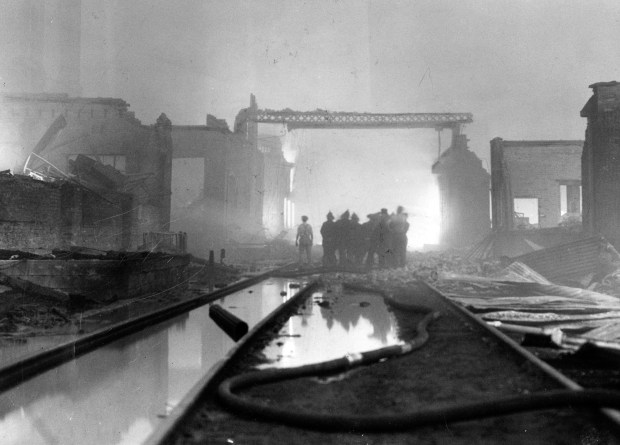When I was young, the Labor Day holiday primarily meant one thing, school was starting, making it both a great (no school!) and terrible (soon, school!) day in my book.
Now, I recognize that despite some of us (my hand is raised) possibly treating Labor Day merely as an extended weekend, there’s real meaning behind taking a day to recognize what is being honored, the workers who built this country, often without receiving the deserved benefits of their hard work.
Chicago is intimately tied to the history of the labor movement and Labor Day. We also have some Chicago-related books that continue to be relevant as we think about both the past and the future of work.
We cannot talk about Chicago and Labor Day without first mentioning Upton Sinclair’s classic, “The Jungle,” informed by Sinclair’s couple of months investigating deep in Chicago’s stockyards, where he saw the worst abuses of workers, and the unsanitary conditions, so vividly rendered, reading the book will put you off hot dogs for a time. This is the seedy underside of Carl Sandburg’s “Hog butcher for the world,” exposed by perhaps our all-time greatest muckraker.
Another Chicago original, Studs Terkel, is responsible for another great Labor Day book, “Working: People Talk About What They Do All Day, and How They Feel About What They Do.” Each entry focuses on a single job — police officer, pipefitter, jockey, newspaper deliverer, et al. — structured as a vignette told in the subject’s voice, bringing both the job and the individual doing the job to life. First published in 1974, some of the jobs now barely exist, or involve very different types of labor than at the time of Terkel’s investigations, but in my view, this only enhances the book’s impact.
As automation has claimed labor once done by hand, it is interesting to appreciate how many of these things were once resolutely human work. And Terkel’s unquenchable curiosity, as embodied in the second half of the book’s subtitle, makes each entry unique, and invaluable as sources to reflect on the work we do ourselves, and why.
“Death in the Haymarket: A Story of Chicago, the First Labor Movement, and the Bombing Divided Gilded Age America,” by James Green is a must-read for anyone who considers themselves an aficionado of the city’s history or the broader labor movement. During a May Day worker’s march advocating for an eight-hour workday, as police moved to disperse the assembly, a bomb was detonated, killing seven officers, at least four civilians and injuring many. The resulting trial of eight known anarchists divided the public, as some believed retribution on the workers was deserved, and others saw the power of the wealthy elite being used to crush the common laborer. Green explores not just the events themselves, bringing the chaos of the day to life, but their broader importance in the long history of labor that still resonates today.
Finally, I want to share a newer book that’s about people who do not work, but in the spirit of Chicago connection, is published by the city’s own Haymarket Books, a publisher with the stated mission of contributing to the “struggles of social and economic justice.”
The title of Rob Larson’s “Mastering the Universe: The Obscene Wealth of the Ruling Class, What They Do with Their Money, and Why You Should Hate Them Even More” may be off-putting to some, but I would argue those who recoil may stand to benefit most from reading the book. The wealth of Larson’s subjects is literally unfathomable, and the system that makes such riches possible surely needs close examination.
John Warner is the author of “Why They Can’t Write: Killing the Five-Paragraph Essay and Other Necessities.”
Book recommendations from the Biblioracle
John Warner tells you what to read based on the last five books you’ve read.
1. “The Heaven and Earth Grocery Store” by James McBride
2. “Go as a River” by Shelley Read
3. “The Women” by Kristin Hannah
4. “The Demon of Unrest: A Saga of Hubris, Heartbreak, and Heroism at the Dawn of the Civil War” by Erik Larson
5. “James” by Percival Everett
— Ronda, Oak Park
Ronda is doing a great job latching onto pleasing books that have gotten a lot of attention. I’m going to try to put her on a pleasing book that maybe doesn’t get the attention it deserves: “The World Without You” by Joshua Henkin.
1. “On Call: A Doctor’s Journey in Public Service” by Anthony Fauci
2. “Julius Rosenwald: The Man who Built Sears, Roebuck and Advanced the Cause of Black Education in the American South” by Peter M. Ascoli
3. “Do Not Discard” by Marlene Byrne
4. “Heiress, Rebel, Vigilante, Bomber: The Extraordinary Life of Rose Dugdale” by Sean O’Driscoll
5. “Lady Almina and the Real Downton Abbey” by Fiona, 8th Countess of Carnarvon
— Mary Ann R., Barrington
If I hadn’t written about it above, I’d recommend “Death in the Haymarket,” but that feels like a cheat. I’m also going to defy the trend toward nonfiction and see if I can’t slip in a novel with plenty of history at its center, “Death at Greenway” by Lori Rader-Day.
1. “Funny Story” by Emily Henry
2. “The Bee Sting” by Paul Murray
3. “Ready Player One” by Ernest Cline
4. “Done and Dusted” by Lyla Sage
5. “Conversations with Friends” by Sally Rooney
— Sienna W., Chicago
I think Sienna looks like someone who might be interested in a book told entirely through Slack messages: “Several People Are Typing” by Calvin Kasulke.
Get a reading from the Biblioracle
Send a list of the last five books you’ve read and your hometown to biblioracle@gmail.com.



